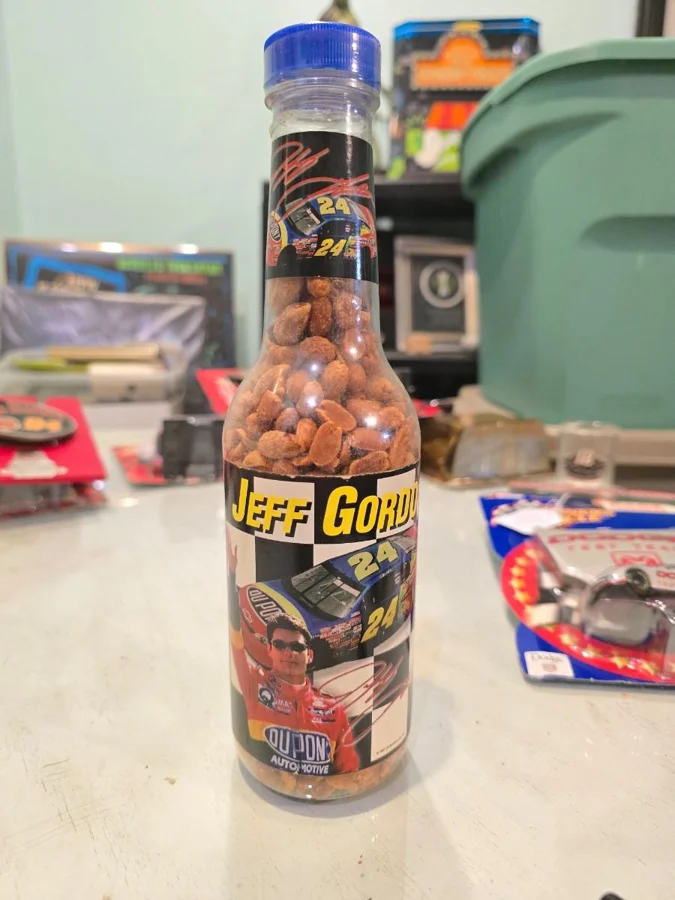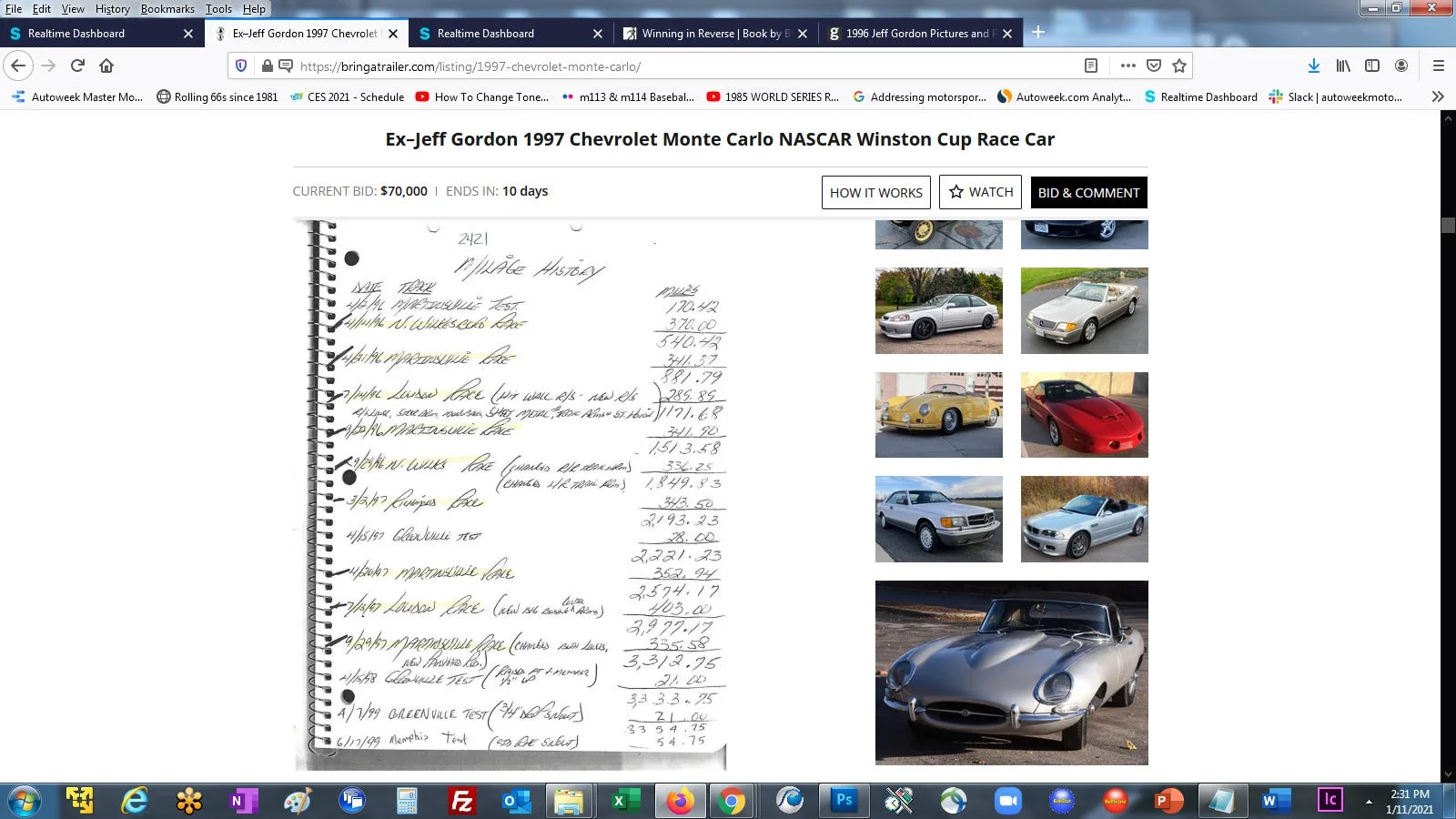The Jeff Gordon auction controversy has ignited strong reactions among NASCAR fans after an Atlanta-based company listed vehicles allegedly driven by Jeff Gordon and Dale Earnhardt Jr. in their final races, with many questioning the authenticity and origins of these stock cars. This situation echoes a previous scandal and has stirred emotions due to concerns about the integrity of NASCAR history and the potential sale of fraudulent memorabilia.
Fresh Outrage as Auction Claims Iconic Racing Cars
Devoted NASCAR fans continually search for unique collector’s items, and few prizes are as coveted as the vehicles driven by legends such as Jeff Gordon and Dale Earnhardt Jr. Yet, this valuable appeal makes the market ripe for disputes and doubts. Back in 2019, controversy erupted when vehicles allegedly linked to ‘the Intimidator’ Dale Earnhardt and his son, Dale Earnhardt Jr., were offered at a Mecum auction, with the most disputed being a 1994 Chevy Lumina claimed to have clinched Earnhardt’s seventh title. However, Richard Childress Racing, long associated with Earnhardt, challenged this claim by confirming the chassis number did not match their records, warning buyers of potential deception. Despite these allegations, the vehicle was sold at a high price, setting a troubling precedent in the eyes of fans and memorabilia collectors, who saw it as a serious blow to NASCAR’s legacy.

In a scenario reminiscent of that scandal, a recent auction listing created widespread commotion within the fanbase. A Georgia-based company—Joey Martin Auctioneers—posted information about two stock cars supposedly driven during Dale Earnhardt Jr. and Jeff Gordon’s farewell races. The cars in question: a 2016 No. 24 Chevy linked to Gordon’s final appearance at Martinsville, and a 2017 No. 88 said to represent Junior’s last laps, both instantly evoking significant interest—and suspicion—among fans.
Details of the Alleged Final-Ride Auction Listings
Jeff Gordon, who retired from full-time racing after the 2015 season, made a series of substitute appearances in the 2016 campaign, most notably finishing 6th at the 2016 Goody’s Fast Relief 500 in Martinsville. The auction listing claimed the available car was the No. 24 Chevy he drove in that event. Yet, serious doubts arose as Gordon exclusively drove the No. 88 during his substitute appearances in 2016, never returning to the No. 24 traditionally tied to him throughout his career. The factual inaccuracy of this prominent detail set off alarm bells among eagle-eyed fans and motorsports insiders alike.
Turning to Earnhardt Jr., his final full season in 2017 saw him retire after racing the No. 88 chevrolet/”>Chevrolet, notably sporting a red and black tribute design created by Sam Bass, reflecting deep NASCAR traditions. The reverent paint scheme celebrated both Junior’s own journey and a broader respect for the sport’s history as he said goodbye at Homestead-Miami Speedway. A pivotal moment after his last race saw Earnhardt Jr. fulfill a personal pact: he handed over his helmet to Hendrick Motorsports owner Rick Hendrick on pit road, while in return, Junior was to keep his last car. These widely known gestures are a core part of recent NASCAR lore and are well-remembered by dedicated followers.
Some auction/liquidation company in Georgia is selling two NASCAR stock cars claiming they are the cars that @DaleJr and @JeffGordonWeb made their final starts in. (via u/Comfortable_Rock4877) https://t.co/ENGj6NF6x3 #NASCAR— r/NASCAR on Reddit (@NASCARonReddit) November 6, 2025
— r/NASCAR on Reddit (@NASCARonReddit)
Moments such as Junior’s last career race and the symbolic transfer of his helmet to Rick Hendrick are etched into racing history. Even Jeff Gordon received a similar sendoff, handing his helmet to the same team owner in 2015. These acts fortified the belief among fans that both retiring drivers rose from the track for the final time in cars that remain in their possession or in trusted hands, not with third-party sellers.
The deal I had with Rick was if I finished the race with the car in one piece, I’d get the car and he’d get the helmet. So, yeah, I’m going to take this thing back home.
— Dale Earnhardt Jr., NASCAR Veteran
That is our deal. That is the same deal he had with Jeff (Gordon) … that Jeff gave him the helmet, and Jeff got the car. And so, I think that is the same deal I’m going to get with Rick,
— Dale Earnhardt Jr., NASCAR Veteran
With these traditions in mind, it’s clear why many consider any auction claim of possessing the actual last-race cars dubious at best, set against the background of personal agreements between the legendary drivers and Rick Hendrick.
Community Reacts with Skepticism and Concern
News of these purported final rides finding their way to the auction block has not sat well with fans, prompting a flurry of discussion and pointed questions about authenticity. Longtime observers were quick to notice discrepancies—including mismatched car numbers, inconsistencies in paint schemes, and technical specifications not aligning with the documented vehicles for each driver’s farewell race. The highly emotional response reflects both the deep attachment to the legends themselves and the frustration of potentially misleading sales practices tainting revered NASCAR traditions.
I’m pretty sure Jr. has ownership of the car he made his final Cup start in,
— Unnamed fan
I believe Jr. has stated on his pod that he has the car from his last start.
— Unnamed fan
That is def not the final Jr car. Maybe I’m dumb and don’t know something, but Jr’s final race was the Axalt throwback scheme. That Diet dew car is from like 2014,
— Unnamed fan
Aren’t these spoilers too tall to be either of their final ride? I know 2015 had a lower downforce aero package, but I can’t remember what 2016 had….
— Unnamed fan
Despite the cloud of doubt, some voices in the community still express an enduring fascination with the possibility of owning an authentic piece of NASCAR heritage—though they admit the lure comes with high risks and steep costs.
Despite the fact that these ones might be kinda a scam or at least not fully honestly advertised, I see a lot of old nascars on facebook. Kinda wanna buy one and make it street legal or buy a street legal one, I follow a tiktok page of a guy that has a weird gen 6/7 hybrid and it’s sick. They’re expensive af though.
— Unnamed fan
Comments like these highlight a community at once passionate and vigilant, eager to keep NASCAR’s legacy untarnished while navigating the emotional turbulence of enduring another potential auction scandal. Words like “scam,” “bluff,” and “not honestly advertised” run through forums and social media, demonstrating the charged and heavy atmosphere surrounding this latest episode.
The Broader Impact on NASCAR’s Reputation and Collectibles Market
Incidents like the Jeff Gordon auction controversy have ramifications far beyond the individual sale, reverberating throughout the community of collectors, drivers, and racing historians. As suspicions linger over the legitimacy of high-profile sports memorabilia, auction organizers face increasing calls for transparency and verifiable records. Repeated doubts, particularly when linked to beloved figures such as Jeff Gordon and Dale Earnhardt Jr., risk undermining the trust of genuine enthusiasts and the market’s stability.
With each new controversy, NASCAR’s integrity appears less certain in the eyes of the public, even as fan interest endures. The repeated involvement of established teams like Richard Childress Racing and Hendrick Motorsports in disputing claims adds to the turbulence, demanding more accountability from sellers—including companies like Joey Martin Auctioneers and any outlets presenting high-value collectibles.
The latest developments suggest that while nostalgia and admiration for legendary drivers run deep, the drive for authenticity, documentation, and respect for the history of drivers such as Jeff Gordon and Dale Earnhardt Jr. now matter more than ever. As the controversy escalates, the call for stricter oversight and factual clarity is certain to continue, shaping how fans, collectors, and organizations approach the legacy of America’s most iconic racing series in the future.
Some auction/liquidation company in Georgia is selling two NASCAR stock cars claiming they are the cars that @DaleJr and @JeffGordonWeb made their final starts in. (via u/Comfortable_Rock4877) https://t.co/ENGj6NF6x3 #NASCAR
— r/NASCAR on Reddit (@NASCARonReddit) November 6, 2025
Some auction/liquidation company in Georgia is selling two NASCAR stock cars claiming they are the cars that Dale Jr. and Jeff Gordon made their final starts in.
byu/Comfortable_Rock4877 inNASCAR
